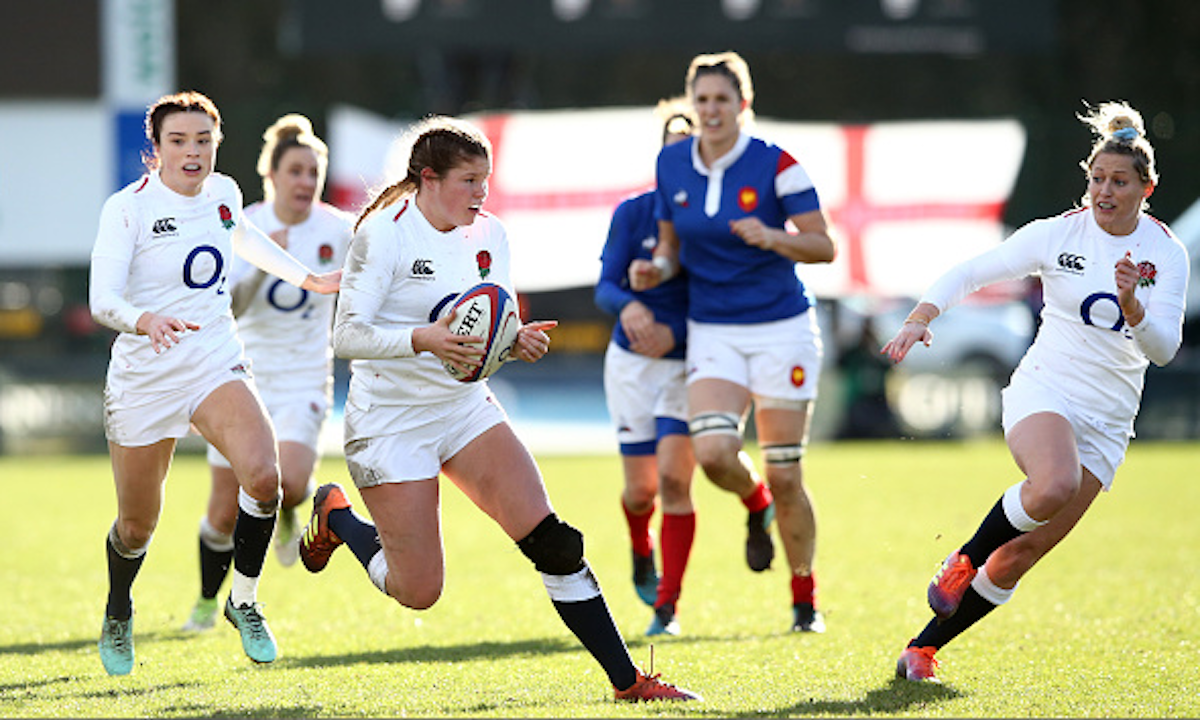Womens Rugby
Women’s rugby commentary: there is no better time for a paradigm shift

8.7 million rugby fans tuned into Scotland deservedly beating England at Twickenham for the first time in 38 years on Saturday. Little did they know, there was another upset playing out in Devon as Exeter Chiefs Women secured their fourth win on the bounce, seeing off Harlequins in a nail-biting battle. A modest 1600 viewers tuned in to the game, which boasted a number of future England stars giving Simon Middleton something to think about in preparation for his Six Nations and World Cup campaigns. 2021 could be the year for women’s rugby.
Born into a rugby mad family, I grew up watching my dad play at Old Albanians RFC. As he edged closer to retirement, he stayed on the pitch at half time to give me and my brother some high catches and a chance to practice our passing and kicking. After the game, you would either find me drinking the dregs of beer on the tables or singing the club song, sat on the bar. It was a male rich environment. More often than not, the only women in the clubhouse the whole weekend were either running the bar, cooking the food, or picking the kids up.
Times have changed. Not only is there a place for women’s rugby in the clubhouse, there is a place for women’s rugby across the world. I am proud to say that I am a fan of women’s rugby, a convert; the views of yesteryear are outdated. Even better, recent successes have proved that women’s rugby is firmly on the map and is here to stay.
Increasingly inspired by the impact many are having in promoting rugby to demographics that otherwise may not have had an opportunity to play (see Vitality Grassroots Sportswomen of the Year 2020, Zainab Alema, for example) it is also great to see the likes of Maggie Alphonsi, Nolli Waterman and Kat Merchant on our screens as pundits. There is great hope for the future generations of Red Roses.
There has, however, been one reoccurring theme throughout the increasing exposure that has greatly stunted the game’s growth – the commentary.
I have been fortunate to see, first-hand, the dedication and commitment made by players at Premier 15s and International level. There is nothing lesser about what these athletes put themselves through to achieve their goals in comparison to the men’s game. In fact, there is a whole lot more as the large majority have to balance full-time jobs, studying for degrees or in some examples, leading the nations efforts in combating COVID-19. These rugby players deserve far more respect, at all levels.
Yet, whilst watching and listening to the matches, comments regarding the sport are unappreciative and condescending. Even worse, these comments are echoed through the fan base. Despite the highly qualified pundits providing their expert insight, this shift must happen now, if the followership is going to continue to grow as it should.
Whilst we have been fortunate to have a steady stream of rugby to watch over the winter months, the Allianz Premier 15s games tend to have a similar issue.
Exeter have caused two huge upsets, and in doing so inflicting Saracens’ first loss since October 2018 last week. In a game that looked like it could come down to the wire, Saracens unleashed England International Poppy Cleall from the bench. In a pivotal moment in the game when Saracens had the upper hand and momentum, they were awarded penalty advantage and a ‘free play’. Cleall, typically a second row or back row forward, kicked the ball away in anticipation of being awarded the subsequent penalty. Commentary followed, ‘we’ll let her off that one’. Holly Aitchison missed touch, Exeter were on the front foot and the game shifted into their hands. Should Cleall have been let off? Or had she kicked the game away?
As we wait for the Red Roses to play their Six Nations Competition in April – out of the shadows of the men’s tournament – last Autumn, 1.5 million viewers tuned in to watch the scintillating two-match series between England and France. One game displayed a dominant England side become top on the world rankings followed by an astonishing comeback against a passionate French team at the Home of Rugby a week later.
There was also a defining moment during the Red Rose’s Grand Slam Six Nations win against Italy last season. Thirty-three minutes in, England were dominating. With penalty advantage, inside centre Amber Reed broke through the Italian defence on the attacking 22m line and offloaded to scrum-half Claudia MacDonald, only for the opportunity to go begging. Clearly devastated, MacDonald trudged back, hands on head.
Embed from Getty ImagesThe commentary that followed completely under-valued the sport. “She’s smiling, that’s alright” and “She knows she had the advantage, so it’s fine”. No. It was a clear error. I am sure the first person to say she should have done better, is the England half-back herself.
Echo a similar situation in men’s rugby. Those that watched the Six Nations this weekend saw two fly-halves get a slating for missing two rather large opportunities. With Billy Burns missing touch in the final play of Wales vs Ireland and ruining a last gasp chance to steal the game, and Owen Farrell neglecting a 4 man overlap by kicking the ball down Stuart Hogg’s throat, it seems that in the women’s game the commentary is far more forgiving. This should not be the case, particularly whilst the most passionate women’s rugby advocates are pushing hard for equality. The sympathetic commentary should be reserved for the parents on the sidelines of the grassroots level; the future Red Roses who play on a Sunday morning at their local club.
Embed from Getty ImagesA missed tackle whilst watching the Red Roses would be met with a comment like ‘that was a good effort to try make that tackle’. It happens more often than not. A similar scenario in the men’s game would draw some deep analysis of what that missed tackle means for the team. As a consequence, the supporters deem these belittling comments acceptable and they are echoed throughout the rugby circles.
Another comparison worth making is one we often hear regarding the styles of play – northern vs southern hemisphere – but the commentary style is noticeably different too. We should learn from some of the Farah Palmer Cup commentary. There is a great deal more conviction and passion, no differentiation between what you’d see and hear in a Mitre 10 Cup game. Even better, you won’t find many negative comments regarding the competition in their resident country either. A coincidence? Perhaps not.
Now, with the buildup to the busy calendar of rugby in 2021, our Red Roses deserve greater appreciation. There is no better place to start than with the Premier 15s and the way we, from fans to commentators alike, observe and articulate our views on the analysis of the game.
If the women’s game is to be taken seriously, then the players cannot be treated differently. Now more than ever, that has to begin with how we make comment about it.
Premiership
RFU announce Premier 15s tender process

By Emily Liles
25/8/22
The Rugby Football Union have today announced that the new Premier 15s league is now entering the next stage in its tender process with the issue of the Request for Proposals (RFP) on Monday, September 5.
The RFP will be issued to all clubs who formally responded to the Expression of Interest, which closed on Friday 12th August 2022 and the deadline for the submission of responses to the RFP is 28th October 2022 at 1700.
Alex Teasdale, head of women’s game at the RFU commented: “This is a really exciting phase of development for the next cycle of the Premier 15s league. All clubs who responded to the formal Expression of Interest will now set out their approach for the next cycle of Premier 15s and provide further detail around how their club will deliver against the criteria as set out in the RFP and support the delivery of a progressive league both on and off the pitch.
“Within the RFP there is an option for those responding clubs to meet with the RFU during September and October to discuss the process and any queries they have regarding this stage. We are looking forward to receiving the responses to the RFP and progressing the development plans to ensure we deliver a robust platform and ensure the next cycle of the Premier 15s continues to grow the sport at every level.”
By 22nd November 2022 a Selection Panel, comprised of representatives of the RFU and sport specialists independent of clubs involved in the process, will evaluate all the responses to the RFP and subsequently create a shortlist of clubs. Those shortlisted clubs will then present their approach for the Premier 15s to the Selection Panel at agreed times between 28th November and 7th December.
Subject to any appeals, all shortlisted clubs will be notified of the Selection Panel’s decision on the inclusion of clubs in the next cycle of the Premier 15s by the end of December this year.
An announcement will be made in Spring 2023 celebrating the successful clubs who will compete in the Allianz Premier 15s from the 2023/24 season.
The timeline for the next stage of development is listed below:
5th September 2022: RFPs issued to interested clubs
September – October 2022: Opportunity for interested clubs to meet with RFU
1700 hours, 28th October 2022: Deadline for responses to RFP
By 22nd November 2022: Selection panel will have evaluated RFP responses and a shortlist of clubs created
Between 28th November and 7th December 2022: Shortlisted clubs to present responses to RFP to Selection Panel
End December 2022: All shortlisted clubs notified of Selection Panel results, subject to appeals
Spring 2023: Participation agreements issued to successful applicants
International
RFU Council votes in favour of change to gender participation policy

| Press release issued by Rugby Football Union |
- The RFU Council has approved a new gender participation policy following extensive stakeholder consultation and thorough review of all available scientific evidence
- New policy takes a precautionary approach by prioritising safety of players
- RFU promoting opportunities for everyone to participate in rugby offering a range of formats and ways to get involved along with a confidential helpline
- RFU committed to working with World Rugby and UK Sports Councils to ensure further research is conducted and to reviewing the policy on a regular basis
Following an extensive RFU consultation, the RFU Council has voted in favour of updating its gender participation policy for rugby in England from the start of the 2022/23 season with 33 in favour, 26 against and 2 abstaining.
The RFU began a detailed review of its policy in Autumn 2020, this included a game wide survey receiving over 11,000 responses, extensive consultation with and listening to a wide range of independent experts as well as considering all available scientific evidence along with liaising with other sporting bodies.
The review and consultation concluded that detailed peer reviewed research provides evidence that there are physical differences between those people whose sex originally recorded as male and those as female at birth, and advantages in strength, stamina and physique brought about by testosterone and male puberty are significant and retained even after testosterone suppression.
This science provides the basis of the new gender participation policy that concludes the inclusion of trans people originally recorded male at birth in female contact rugby cannot be balanced against considerations of safety and fairness.
The RFU Council has determined that until such time as new further peer-reviewed science is available, a precautionary approach is appropriate to ensure fair competition and safety of all competitors. Therefore, the RFU Council approved a policy change to only permit players in the female category if the sex originally recorded at birth is female.
The RFU recognises this was a complex and difficult decision and the policy change was not taken lightly or without thorough and full research and consultation. Speaking about the decision, RFU President, His Honour Jeff Blackett said: “I would like to thank everyone for the passion, time and effort that has been put in to consulting with us and informing this policy review. Inclusion is at the heart of rugby values and we will continue to work with everyone to keep listening, learning and finding ways to demonstrate there is a place for everyone in our game. We know that many will be disappointed by this decision however, it has been based on all the scientific evidence available. Our game can be strengthened by everyone who is involved; be it in coaching, refereeing, administration or supporting and playing non-contact forms of the game.”
The RFU also considered the merits of a case-by-case assessment process, but in light of the research findings and work of World Rugby and the UK Sports Councils, and given the difficulties in identifying a credible test to assess physiological variables, this is no longer a viable option at this time and does not necessarily ensure inclusion. World Rugby has a dedicated funding stream for research in this area and the RFU will continue to work with World Rugby and other stakeholders in promoting research to continue.
In the male category, players whose sex recorded at birth is female may play if they provide their written consent and a risk assessment is carried out.
The RFU is committed to supporting and encouraging opportunities for everyone to participate in rugby including non-contact formats of the game and through coaching, refereeing or volunteering roles. If anyone would like to find out more about how rugby can be inclusive to them and would like to get involved they can contact the RFU via [email protected] . For anyone who wants advice on mental-wellbeing please see this link.
The RFU has contacted the registered trans women players, who the revised policy has a direct impact on, to offer its support in continuing to encourage them to participate in the sport. The RFU will continue to listen and review its policy on a regular basis and welcomes all new research on this subject to inform these reviews.
For further information on the review please click here:
RFU Gender Participation Policy – frequently asked questions
RFU Gender Participation video
6 Nations
Women’s Six Nations 2022 schedule revealed

- All matches to be shown in the UK, Ireland and Italy
- The Women’s Six Nations remains in its own dedicated window in the calendar in March and April
- The introduction of ‘Super Saturday’ on April 30 is set to become a key highlight of the women’s rugby calendar
Fans are set to enjoy a greatly enhanced Women’s Six Nations in 2022 thanks to a massive increase in coverage on broadcast networks in the UK, Ireland and Italy and a confirmed stand-alone slot in the calendar.
The 2022 Championship will see all 15 matches broadcast on BBC in the UK, RTÉ and Virgin Media in Ireland and Sky Italia for the Italian market. Details for France will be communicated in due course.
Matches will be shown on a mix of terrestrial and Player services with broadcasters across territories significantly increasing their commitment to the women’s game.
Changes to the Women’s Six Nations window in 2021 proved a major success with high viewing figures and increased digital engagement indicating confirming that a new slot in the calendar can play a significant role in driving the growth of the women’s game.
The 2022 matches will also be played in a six-week window in late March and April, breaking the traditional link to the men’s calendar.

Scotland will open the Championship against 2021 champions England at DAM Health Stadium on 26th March, while Ireland will take on Wales at the RDS Arena on the same day.
Round 2 will take place on 2nd and 3rd April with Wales hosting Scotland at the Cardiff Arms Park while Ireland will travel to France on Saturday 2nd April. Meanwhile, England will travel to Italy for their game on Sunday 3rd April.
The third round will see England host Wales on Saturday 9th April with the other two matches taking place on Sunday 10th April when Scotland will host France and Italy will travel to Cork.
After a break weekend, Round 4 will start on Friday 22nd April in Cardiff with Wales v France. Italy v Scotland will be on Saturday 23rd and England will host Ireland on Sunday 24th April.
The Championship will end with a Super Saturday as Wales v Italy, Ireland v Scotland and France v England take place on the same day.
Six Nations CEO Ben Morel commented: “Increased visibility is key for the growth of the women’s game. We are delighted to have enhanced broadcast partnerships in place along with a continuation of the dedicated window from which we saw such success last year.
“These two key developments along with continued investment in many other areas including performance, commercial and marketing will enhance the Women’s Six Nations for fans and players alike.”













